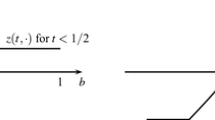Abstract
In a seminal paper, Aumann (1987, Econometrica 55, 1–18) showed how the choices of rational players could be analyzed in a unified state space framework. His innovation was to include the choices of the players in the description of the states, thus abolishing Savage’s (1954, The Foundations of Statistics. Wiley, New York) distinction between acts and consequences. But this simplification comes at a price: Aumann’s notion of Bayes rationality does not allow players to evaluate what would happen were they to deviate from their actual choices. We show how the addition of a causal structure to the framework enables us to analyze such counterfactual statements, and use it to introduce a notion of causal rationality. Under a plausible causal independence condition, the two notions are shown to be equivalent. If we are prepared to accept this condition we can dispense with the causal apparatus and retain Aumann’s original framework.
Similar content being viewed by others
References
R.J. Aumann (1987) ArticleTitleCorrelated equilibrium as an expression of Bayesian rationality Econometrica 55 1–18
R.J. Aumann A. Brandenburger (1995) ArticleTitleEpistemic conditions for Nash equilibrium Econometrica 63 1161–1180
P. Battigalli (1996) ArticleTitleStrategic independence and perfect Bayesian equilibria Journal of Economic Theory 70 201–234 Occurrence Handle10.1006/jeth.1996.0082
P. Battigalli G. Bonanno (1999) ArticleTitleRecent results on belief, knowledge and the epistemic foundations of game theory Research in Economics 53 149–225 Occurrence Handle10.1006/reec.1999.0187
P. Battigalli M. Siniscalchi (2002) ArticleTitleStrong belief and forward-induction reasoning Journal of Economic Theory 106 356–391 Occurrence Handle10.1006/jeth.2001.2942
E. Ben Porath (1997) ArticleTitleRationality, Nash equilibrium and backwards induction in perfect information games Review of Economic Studies 64 23–46 Occurrence Handle10.2307/2971739
B.D. Bernheim (1984) ArticleTitleRationalizable Strategic Behavior Econometrica 52 1007–1028
E. Dekel F. Gul (1997) Rationality and knowledge in game theory D.M. Kreps K.W. Wallis (Eds) Advances in Economics and Econometrics: Theory and Applications: Seventh World Congress Vol. 1. Cambridge University Press Cambridge 87–172
A. Gibbard W.L. Harper (1978) Counterfactuals and two kinds of expected utility C.A. Hooker J.J. Leach E.F. McClennan (Eds) Foundations and Applications of Decision Theory Vol. I. Reidel Dordrecht
W.L. Harper (1988) Causal decision theory and game theory: a classic argument for equilibrium solutions, a defense of weak equilibria, and a new problem for the normal form representation W.L. Harper B. Skyrms (Eds) Causation in Decision, Belief Change, and Statistics, II Kluwer Academic Publishers Amsterdam
R.C. Jeffrey (1965) The Logic of Decision McGraw-Hill New York, NY
R.C. Jeffrey (1983) The Logic of Decision EditionNumber2 The University of Chicago Press Chicago, IL
D. Lewis (1973) Counterfactuals Basil Blackwell Oxford
D. Lewis (1981) ArticleTitleCausal decision theory Australasian Journal of Philosophy 59 5–30 Occurrence Handle10.1080/00048408112340011
M.J. Osborne A. Rubinstein (1994) A Course in Game Theory The MIT Press Cambridge, MA
D.G. Pearce (1984) ArticleTitleRationalizable strategic behavior and the problem of perfection Econometrica 52 1029–1050
L.J. Savage (1954) The Foundations of Statistics Wiley New York
R. Selten (1975) ArticleTitleReexamination of the perfectness concept for equilibrium points in extensive games International Journal of Game Theory 4 25–55 Occurrence Handle10.1007/BF01766400
H.S. Shin (1989) Two notions of ratifiability and equilibrium in games M. Bacharach S. Hurley (Eds) Foundations of Decision Theory Basil Blackwell Oxford
H.S. Shin (1992) Counterfactuals and a theory of equilibrium in games C. Bicchieri M.L. Dalla Chiara (Eds) Knowledge, Belief, and Strategic Interaction. Cambridge University Press Cambridge
B. Skyrms (1982) ArticleTitleCausal decision theory Journal of Philosophy 79 695–711 Occurrence Handle10.2307/2026547
J.H. Sobel (1986) ArticleTitleNotes on decision theory: old wine in new bottles choice Australasian Journal of Philosophy 64 407–437 Occurrence Handle10.1080/00048408612342621
R. Stalnaker (1968) A theory of conditionals N. Rescher (Eds) Studies in Logical Theory Basil Blackwell Oxford
R. Stalnaker (1996) ArticleTitleKnowledge, belief and counterfactual reasoning in games Economics and Philosophy 12 133–163 Occurrence Handle10.1017/S0266267100004132
R. Stalnaker (1999) ArticleTitleExtensive and strategic form games: games and models for games Research in Economics 53 293–319 Occurrence Handle10.1006/reec.1999.0200
Zambrano, E. (2004), Counterfactual reasoning and common knowledge of rationality in normal form games, Topics in Theoretical Economics 4 , article 8.
Author information
Authors and Affiliations
Corresponding author
Rights and permissions
About this article
Cite this article
Board, O. The Equivalence of Bayes and Causal Rationality in Games. Theor Decis 61, 1–19 (2006). https://doi.org/10.1007/s11238-006-7868-y
Issue Date:
DOI: https://doi.org/10.1007/s11238-006-7868-y




